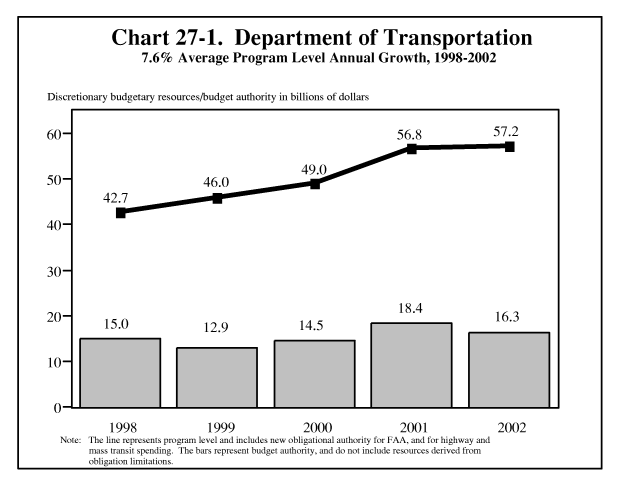
- Afghanistan
- Africa
- Budget Management
- Defense
- Economy
- Education
- Energy
- Environment
- Global Diplomacy
- Health Care
- Homeland Security
- Immigration
- International Trade
- Iraq
- Judicial Nominations
- Middle East
- National Security
- Veterans
|
Home >
News & Policies
|
27. Department of Transportation
|
Initiatives
Highway, Transit, and Aviation Funding: The President's Budget seeks to fully fund the guarantee levels provided for highway and mass transportation under the Transportation Equity Act for the 21st Century and for the Federal Aviation Administration's operating and capital programs under the Aviation Investment and Reform Act for the 21st Century. Both acts provide substantial additional assistance to ensure an appropriate level of continued investment in the Nation's roads, bridges, transit systems, airports and air traffic control systems.

Drug Interdiction: The President's Budget seeks to fully fund the authorizations of the Western Hemisphere Drug Elimination Act. Enacted in 1999, this Act targeted resources to enhance source and transit country coverage and authorized funding for Coast Guard cutters, patrol vessels and air support for counternarcotics efforts. The budget provides $243 million in additional funding under this initiative for the acquisition, construction, and improvement of ships, planes, and equipment to enhance interdiction efforts and to replace Coast Guard's aging fleet of ships and aircraft.
New Freedom Initiative: The budget funds two new programs totaling $145 million as part of the President's New Freedom Initiative:
-
Pilot Programs for Innovative Transportation provides $45 million to promote innovative transportation solutions for people with disabilities. The selected pilots, run by State or local governments in regional, urban, and rural areas, will be evaluated after three years with the successful initiatives expanded to other areas.
-
Matching Grants for Alternative Transportation provides $100 million in competitive matching grants to promote access to alternative methods of transportation. The funds will aid community-based organizations that seek to integrate Americans with disabilities into the workforce. The funds will go toward the purchase and operation of specialty vans, assisting people with down payment or costs associated with accessible vehicles, and extending the use of existing transportation resources.
Redirected Resources
Unrequested Projects and One-time Reductions: The 2001 appropriations acts included over 90 unrequested projects and earmarked funding totaling over $1 billion outside of the funding guarantee levels. The President's Budget does not propose to repeat one-time special projects.
Ship Construction and Shipyard Modernization: In an effort to trim corporate subsidies, the President's Budget seeks no new funding for the Maritime Guarantee Loan Subsidy Program (Title XI). This program provides loan guarantees at low-rates and for extended-terms for the ship building industry and for shipyard modernization.
Transportation User Fees: To ensure that users pay for specialized services or Government support, the budget assumes that $75 million will be raised from new user fees to offset the costs associated with the regulation of the transportation of hazardous materials, expanded Federal inspection of the Nation's over two million miles of pipeline, and support the railroad safety inspection program.
Potential Reforms
Aviation: The Administration is extremely concerned about delays in the National Airspace system and management problems within the Federal Aviation Administration (FAA). The time has come to implement urgently needed management reforms. The Administration supports efforts to institute improved business practices, organizational changes, and market-oriented techniques to strengthen FAA's operations and reduce system delays, recognizing the role of airlines and airports. As part of this effort, the Administration will work with the aviation community and Congress over the next year to develop a plan of action for improving the Nation's aviation record, and in particular to examine the success that various nations, such as Canada, have experienced with individual air traffic control systems owned and operated by private companies.
Highway Oversight: Given the Federal Highway Administration's role in distributing billions of dollars in Federal funding each year to States for grants and infrastructure projects, it is important to ensure that Federal funding for these projects is being used responsibly. In an effort to address concerns about highway project oversight, the Administration plans to continue to strengthen its ability to provide timely review and evaluations of major highway projects and funding initiatives.
Maritime Security: To consolidate the management of like-programs and achieve greater efficiencies, the budget proposes to transfer the Maritime Security Program and its funding from the Department of Transportation to the Department of Defense. This transfer will ensure a centralized national security focus in the management of this program.


